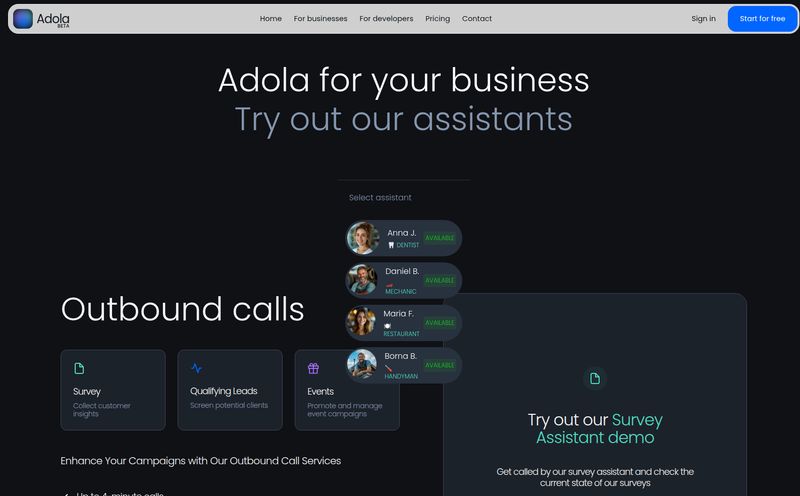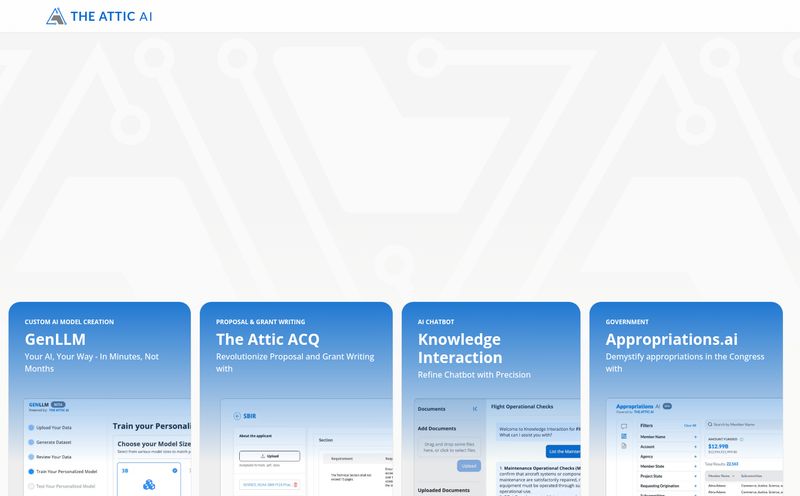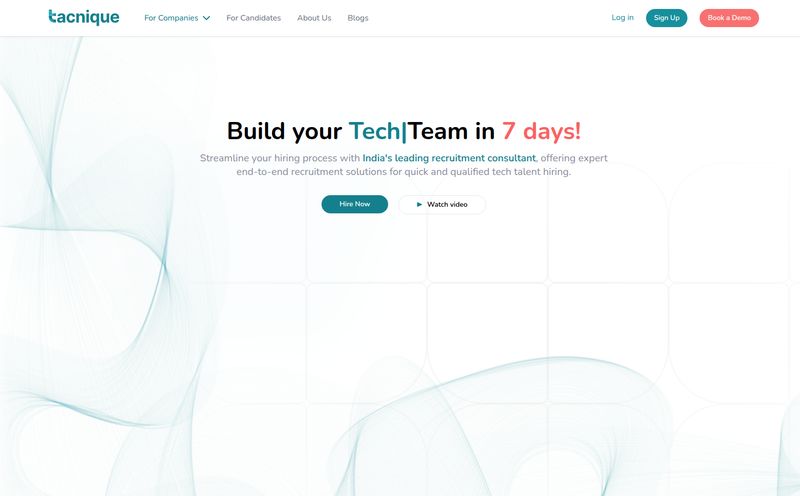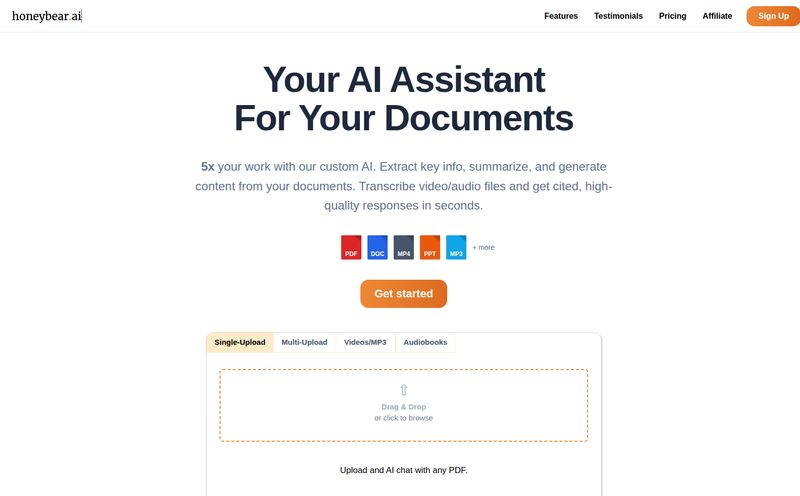I’ve been in the digital marketing and trends space for a long time. And I mean a long time. I’ve seen fads come and go, from QR codes on everything to the brief, baffling obsession with Clubhouse. But one trend that never really dies is our fascination with ourselves. Specifically, personality tests. We’ve all been there, right? Late night, scrolling, and you end up on some quiz that promises to reveal your inner spirit animal or which type of bread you are. (I’m a sourdough, apparently).
Most of us have probably taken the Myers-Briggs (MBTI) test more times than we can count. I know I have. Depending on the day and the website, I’ve been an INTJ, an INTP, and once, mysteriously, an ENFP. It's fun, but it can feel a bit... flimsy. A bit like a horoscope. That's why when I stumbled upon TypeWhisperer, featured on Product Hunt, my curiosity was definitely piqued. A platform that uses AI to analyze your personality? Not through multiple-choice questions, but by analyzing your own words? Okay, now you have my attention.
So, What is TypeWhisperer Actually?
Let’s get this out of the way: TypeWhisperer isn’t your typical online quiz. You don't click bubbles from 1 to 5 on a scale of 'strongly agree' to 'strongly disagree'. Instead, it acts like a digital psychologist of sorts. You provide a sample of your writing—your thoughts, feelings, a story, your perspective on life—and its AI gets to work. It’s a bit like handing over a journal entry and asking, “So, what’s my deal?”
The platform crunches your text through three distinct personality frameworks:
- MBTI (Jungian Type): The classic 16 personality types we know and love (or love to debate).
- The Enneagram: A system of nine interconnected personality types that focuses more on core motivations, fears, and the internal world.
- Instinctual Stack: A component of the Enneagram theory that describes our three main survival instincts (Self-Preservation, Social, and Sexual/One-to-One) and which ones we prioritize.
Combining these three is a pretty smart move. In my experience, relying on just one system can give you a flat, one-dimensional picture. But layering them? That’s where you start to see some real texture and depth.
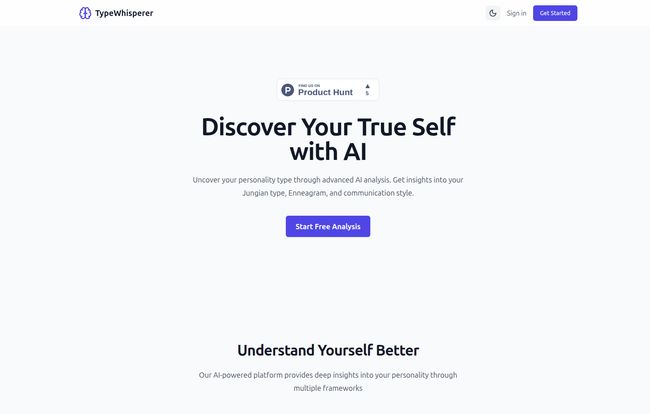
Visit TypeWhisperer
How Does This AI Mind-Reading Work?
The process itself is refreshingly simple. Deceptively so. The website boils it down to three steps, and honestly, that’s all it is. No 90-question marathon sessions here.
- You Write. You're given a simple text box and a prompt to share your thoughts. The more you write, and the more genuinely you it sounds, the better the raw material the AI has to work with. This is the most crucial part. Garbage in, garbage out, as they say.
- The AI Analyzes. This is the black box part. The platform's AI, which I assume has been trained on a massive dataset of text correlated with known personality types, scans your words. It's looking for patterns in communication style, word choice, sentiment, and structure to make its best guess.
- You Get Insights. In a few moments, it spits out a detailed report. Here’s your likely MBTI type, your Enneagram type and wing, your Instinctual Stack, and a breakdown of why it thinks so.
It feels a little like magic, but I’ve been around SEO and algorithm analysis long enough to know it's just very clever pattern recognition. Still, it feels pretty cool.
My First Run-Through and What I Found
I decided to give the free analysis a whirl. I typed out a few paragraphs about my work, my frustrations with fleeting digital trends, and my passion for finding tools that actually provide value. I hit the button and held my breath.
The results were… surprisingly accurate. It pegged me with the MBTI and Enneagram types that I’ve most consistently identified with over the years. But the interesting part wasn't just the label; it was the 'why'. The report pulled out specific phrases and themes from my writing to justify its conclusions. Seeing my own words used as evidence for a particular trait was far more compelling than any quiz result I've ever gotten.
Beyond Just Your Four Letters
What I appreciate most is the multi-system approach. A lot of people get hung up on their MBTI type, but the Enneagram Institute has long argued that motivations (Enneagram) are deeper than behaviors (MBTI). TypeWhisperer doesn’t force you to choose. It presents them as complementary pieces of the puzzle. You’re not just an INTJ; you’re an INTJ who is also an Enneagram Type 5, which paints a much clearer picture of a person who is analytical because they are driven by a need to be competent and avoid helplessness. See? More nuance.
The AI Chat Support
Another neat feature is the AI Chat Support. If you get your results and think, "What on earth is an Instinctual Stack?", you can just ask the chatbot. It’s an interactive way to understand your report without having to open 12 new tabs to Google everything. For newcomers to this stuff, thats a huge plus.
Free vs. Premium: Is an Upgrade Worth It?
The free analysis is a great hook, but of course, there's a premium tier. Unlocking it gets you things like:
- Unlimited personality assessments
- Personalized growth recommendations
- Development tracking over time
- Premium access to the chatbot
Now, here’s the rub: I couldn't find a public pricing page. This is a classic SaaS strategy to get you to sign up and engage first. Is it worth it? I think it depends entirely on who you are. For a casual user, the free analysis is probably enough to satisfy your curiosity. But I can see this being a genuinely useful tool for life coaches, therapists, or even HR managers who want a new way to facilitate team-building and understanding. For someone on a serious personal development path, tracking your evolution and getting tailored growth tips could be incredibly valuable.
The Elephant in the Room: Can We Really Trust an AI?
Look, let's be real. No personality assessment is 100% infallible, whether it's powered by a human or an algorithm. The Myers-Briggs Foundation itself emphasizes that the MBTI is about preferences, not a life sentence. The biggest drawback of TypeWhisperer is the same as its biggest strength: its reliance on AI.
An AI can be biased. It can misinterpret sarcasm. Its effectiveness is completly dependent on the quality of what you feed it. If you write something that isn't truly representative of you, the results will be skewed. Some people might argue that reducing the human psyche to an algorithm is… well, a bit dystopian. I get that.
But here’s my perspective: I don’t see TypeWhisperer as a definitive judge of character. I see it as a very sophisticated mirror. It reflects back the patterns you've given it. The value isn't in blindly accepting the label it gives you. The value is in the reflection. It’s a starting point for introspection, a new set of data points to consider about yourself. And that’s a pretty powerful thing.
Final Thoughts: A Tool for the Curious Modern Mind
So, is TypeWhisperer going to revolutionize psychology? Probably not. But is it a fascinating, innovative, and genuinely useful tool for anyone interested in self-discovery? Absolutely. It breaks the mold of boring, repetitive quizzes and offers a more personal, dynamic path to insight.
If you're tired of the same old personality tests and want to try something that feels a bit more 21st century, I’d say give the free analysis a shot. Go in with an open mind, give it a good, honest piece of your mind (literally), and see what it reflects back at you. You might be surprised by what you learn.
Frequently Asked Questions
- How accurate is TypeWhisperer?
- Its accuracy depends heavily on the honesty and depth of the text you provide. Think of it as a highly educated guess rather than a scientific certainty. It's a tool for reflection, and many users, including myself, find it surprisingly on-point.
- What personality frameworks does TypeWhisperer use?
- It uses a combination of three popular systems: the MBTI (16-personality model), the Enneagram (9-type motivational model), and the Instinctual Stack (a subset of Enneagram theory).
- Is TypeWhisperer free to use?
- Yes, there is a free analysis available. For more advanced features like unlimited assessments, personalized growth tracking, and premium chatbot access, you'll need to sign up for their premium subscription.
- How is TypeWhisperer different from other personality tests?
- The main difference is its method. Instead of you answering a set of multiple-choice questions, its AI analyzes a sample of your own writing to determine your personality type, which can feel more organic and personalized.
- Can I use TypeWhisperer to analyze someone else?
- The platform is designed for self-analysis, but the underlying technology could theoretically analyze any text. However, doing so without permission raises ethical questions, and the results would be based on that person's writing style, not necessarily their inner self.
- What is the Instinctual Stack?
- The Instinctual Stack refers to the three core instincts in Enneagram theory: Self-Preservation (focus on safety, health, home), Social (focus on belonging, community), and Sexual/One-to-One (focus on intense connection, intimacy). The 'stack' is the order of priority for these instincts within your personality.
Conclusion
In a world saturated with content, finding tools that promote genuine introspection is a win in my book. TypeWhisperer is one such tool. It’s not a magic eight ball that will give you all the answers, but it is a clever, AI-powered conversation starter with the most interesting person you know: yourself. For those of us on a quest for better self-understanding, it’s a worthy and intriguing stop on the way.
Reference and Sources
- The Enneagram Institute: https://www.enneagraminstitute.com/
- The Myers & Briggs Foundation: https://www.myersbriggs.org/my-mbti-personality-type/mbti-basics/
